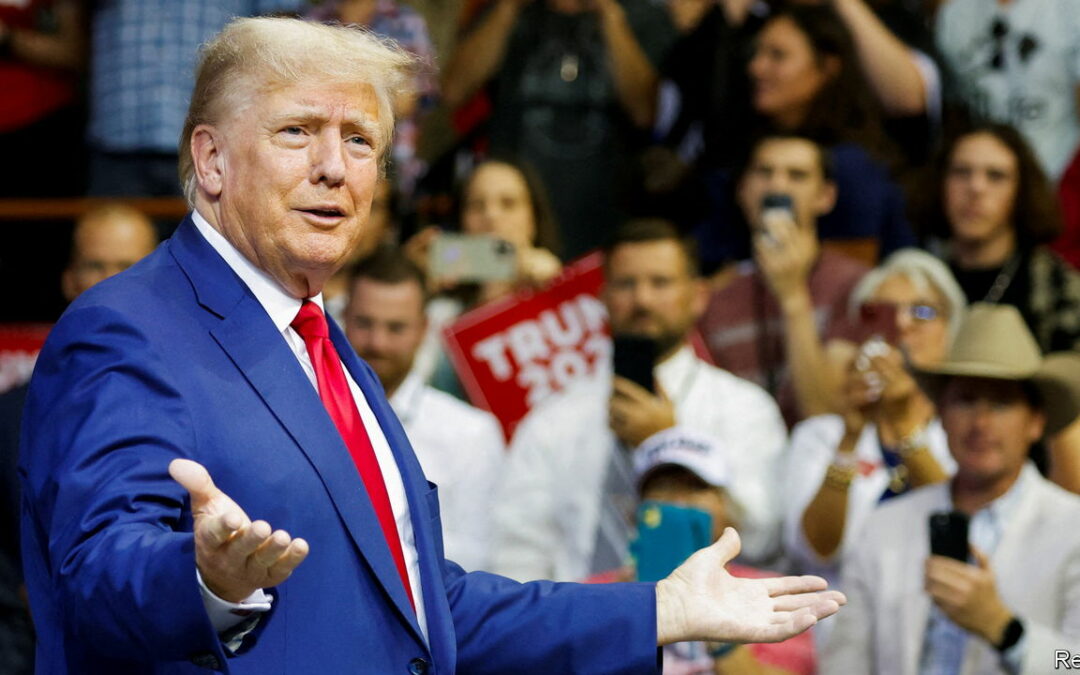DONALD TRUMP’S campaign for re-election is dogged with legal woes. The former president faces the prospect of four criminal trials on felony charges, which will overlap with the Republican primary season and the general-election campaign. But another type of legal trouble could further complicate his return to the White House.
America’s constitution—which Mr Trump swore to uphold on January 20th 2017—includes a provision barring people who have taken such an oath from holding federal office if they have “engaged in insurrection or rebellion” against the country or “given aid or comfort to the enemies thereof”. This language, found in Section 3 of the 14th Amendment, was ratified after the Civil War to prevent former Confederate rebels from having a hand in running the country they had tried to saw in half. The disqualification clause has seen something of a renaissance. A year ago, Couy Griffin, then a county commissioner in New Mexico, was removed from office by a state judge for engaging in insurrection at the Capitol on January 6th. But could this constitutional provision really thwart Mr Trump’s quest for a second presidential term?
The idea gained prominence in August when two respected legal scholars from the right—Will Baude of the University of Chicago and Michael Stokes Paulsen of the University of St. Thomas in Minneapolis—answered this question with an emphatic “yes”. In a 126-page article, to be published next year in the University of Pennsylvania Law Review, they contend that Section 3 “disqualifies” Mr Trump “and potentially many others” who played a role in “the attempted overthrow of the 2020 presidential election”. J. Michael Luttig, a judge appointed by George W. Bush, and Laurence Tribe, a law professor at Harvard University, endorsed the proposal.
But other scholars on the left and right have voiced doubts that Mr Trump’s contributions to the January 6th riot automatically bar him from office. Some question whether the former president can be said to have engaged in an insurrection. Many point to a precedent from 1869 in which Salmon Chase, the chief justice, ruled that Section 3 could only be enforced by Congress. Messrs Baude and Paulsen disagree. They argue that Section 3 is “self-enforcing”. Not having engaged in insurrection or not lending support to America’s enemies, they say, is a requirement for public office in the same way that the presidential minimum age of 35 is—and secretaries of state in the 50 states are therefore empowered to remove Mr Trump’s name from the ballot for the upcoming election.
Lawsuits based on this theory are springing up. Eight voters in Minnesota filed one this month. In Colorado, Citizens for Responsibility and Ethics in Washington, the same watchdog that successfully sued Mr Griffin in New Mexico last year, is suing on behalf of six voters in the state. The organisation argues that Mr Trump is responsible for “recruiting, inciting and encouraging a violent mob that attacked the Capitol” and should not be listed on Colorado’s Republican primary ballot. Similar challenges were brought against Marjorie Taylor Greene and Madison Cawthorn, respectively current and former members of the House of Representatives, but neither resulted in their disqualification. If courts rule that Mr Trump is ineligible to run for office, and secretaries of state begin removing his name from ballots, quick appeals would ensue. The issue would probably reach the Supreme Court, where the justices may want to provide clarity before the first primary votes are cast in January. The surge in attention to the disqualification clause will probably remain mostly academic: it would be remarkable for a majority of the court to subject a presidential election to a largely untested legal theory. ■









